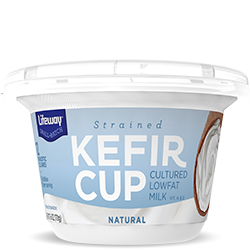Health hack a traditional comfort food like macaroni and cheese with kale and kefir. Our organic plain whole milk kefir keeps this easy recipe creamy but in a lighter, healthier way. We mixed in a handful of kale, the superfood green that packs in more than double the vitamin A than spinach to sneak in extra nutrients. So go ahead – help yourself to a serving (or two) of this delicious and satisfying recipe.
What are probiotics?
Probiotics are “good” bacteria. They are live microorganisms similar to the ones already living in your gut and may offer health benefits when consumed in adequate amounts. The word “probiotic” itself is often translated to “beneficial for life.” It is a derived from the Latin word “pro” meaning “for” and the Greek word “biotic” meaning “life.” With increasing research linking the correlation between probiotics, gut health, and immunity, it’s no secret that the integrity of our gut is vital to our health. Although additional factors such as stress, antibiotic usage, and individual health conditions can contribute to the condition of our gut, a focus on healthy food choices is one of the easiest ways to support the microbiome.
Several studies have shown a strong association between the gut-brain-microbiota. Probiotics introduced to the gut have been found to support immunity, improve allergies, and improve digestion. We’ve discussed before how our brain and gut communicate with each other. Scientists previously thought there was a one-way communication between the brain and the gut, but now realize that it’s a two-way line. Basically, your gut, which is comprised of millions of neurons called the enteric nervous system, is also talking back to your brain. On top of alerting your immune system to foreign invaders, digesting and absorbing nutrients, your gut also produces serotonin. In fact, about 90% of the serotonin in your body is produced by the cells in your gut.
Servings: 4-6Ingredients
- ¼ cup Plain Lowfat Kefir
- ¼ cup Natural Kefir Cup
- 2 cups whole-wheat pasta shells or bow-ties
- 2 cups shredded white cheddar cheese
- 2 cups fresh kale
- ¼ tsp onion powder
- ¼ tsp garlic powder
- salt & pepper to taste
Directions
- Cook pasta according to the package’s instructions (about 8-10 minutes), until al dente.
- Place the kale leaves in the bottom of a strainer, and pour the pasta over top to drain and wilt the kale. Save about 1/2 cup of the pasta water. Return the cooked pasta and kale to the pot.
- Add about 1/4 cup of the reserved pasta water to the pot, and stir in the cheese until melted. Stir in the kefir, skyr, onion powder, garlic powder, salt and pepper until smooth and creamy.
- Stir in the remaining pasta water to thin, if necessary. Serve immediately.


